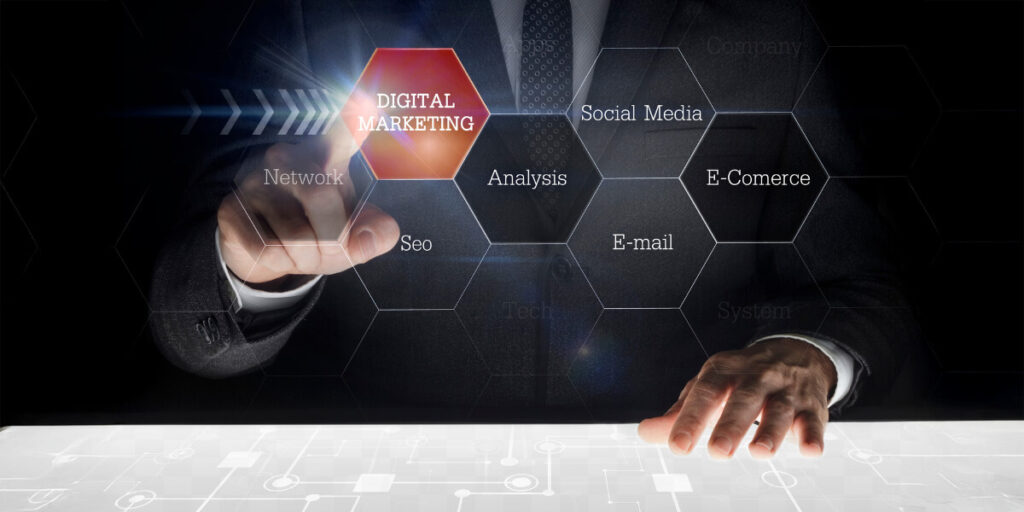
What Is Digital Marketing? (Definition for 2025)
Digital marketing is the practice of promoting products, services, or brands using digital channels, platforms, and technologies to reach consumers where they spend time online.
This includes search engines, websites, social media, email, mobile apps, and other digital mediums that connect businesses with potential customers.
Digital marketing differs from traditional marketing in several key ways:
| Aspect | Digital Marketing | Traditional Marketing |
|---|---|---|
| Channels | Search engines, social media, email, websites | TV, radio, print, billboards, direct mail |
| Targeting | Precise audience segmentation | Broad demographic targeting |
| Measurement | Real-time data and analytics | Limited tracking capabilities |
| Cost | Scalable, often lower entry point | Higher production and placement costs |
| Feedback | Immediate interaction and adjustment | Delayed feedback cycles |
| Reach | Global potential regardless of size | Often limited by geographic constraints |
According to McKinsey’s 2025 Digital Marketing Survey, companies that effectively implement digital marketing strategies see a 32% higher revenue growth compared to those relying primarily on traditional methods.
Why Should Businesses Use Digital Marketing in 2025?
1. Where Are Your Customers Spending Their Time?
In 2025, the average person spends 7.5 hours online daily, with 65% of that time on mobile devices. This represents a fundamental shift in consumer attention that businesses cannot afford to ignore.
2. How Does Digital Marketing Impact Purchase Decisions?
Research shows that 89% of consumers begin their buying process with a search engine query, while 74% rely on social media to guide purchase decisions.
Digital marketing positions your business at these critical decision-making touchpoints.
3. What Cost Advantages Does Digital Marketing Offer?
Digital marketing provides significantly higher ROI compared to traditional channels:
- Email marketing generates $42 for every $1 spent.
- Content marketing costs 62% less than traditional marketing while generating 3x as many leads.
- SEO leads have a 14.6% close rate compared to 1.7% for outbound leads.
4. How Does Digital Marketing Level the Competitive Field?
Digital channels allow small businesses to compete with larger competitors by:
- Targeting specific niche audiences.
- Building communities around specialized interests.
- Leveraging local search advantages.
- Creating personalized customer experiences at scale.
What Are the Core Digital Marketing Channels for 2025?
Search Engine Optimization (SEO)
SEO is the practice of improving a website’s visibility in organic (non-paid) search engine results through technical optimization, content creation, and backlink acquisition.
Modern SEO success in 2025 includes:
- Creating comprehensive, high-quality content that satisfies user intent.
- Technical optimization for Core Web Vitals and mobile-first indexing.
- Building authoritative backlinks.
- Optimizing for AI-driven search features and zero-click results.
- Implementing structured data for enhanced search listings.
Example:
A local bakery optimizes their website for terms like “gluten-free bakery near me” and “custom birthday cakes [city name]” to boost local search visibility.
Content Marketing
Content marketing involves creating and distributing valuable, relevant content to attract and engage a clearly defined audience.
Key content types for 2025:
- Long-form guides and articles.
- Video content optimized for YouTube and social media.
- Interactive content like quizzes and calculators.
- Podcast episodes featuring industry experts.
- Data visualizations and original research.
Example:
A financial advisory firm publishes a comprehensive retirement calculator and supporting articles, drawing in prospective clients.
Social Media Marketing
Social media marketing is the use of platforms like Instagram, LinkedIn, and TikTok to connect with audiences, build brand loyalty, and drive sales.
Platform focus in 2025:
- Instagram: Visual branding, younger demographics.
- TikTok: Viral content, Gen Z engagement.
- LinkedIn: B2B services and professional networking.
- Facebook: Local businesses and community groups.
- X (Twitter): Real-time engagement.
- Pinterest: Visual ideas, predominantly female audience.
Example:
A sustainable fashion brand showcases its eco-friendly production process on TikTok and uses Instagram for product promotion.
Email Marketing
Email marketing remains a powerhouse, delivering the highest ROI among digital channels.
Effective strategies in 2025 include:
- Personalized and behavior-triggered emails.
- Audience segmentation.
- Mobile-optimized campaigns.
- A/B testing for subject lines and design.
- Automation of lead nurturing sequences.
Example:
An online course provider sends a 7-day welcome email series introducing their brand, success stories, and offering a limited-time discount.
Pay-Per-Click (PPC) Advertising
PPC allows businesses to pay for top placements across search engines and social platforms.
Popular PPC channels:
- Google Ads.
- Facebook and Instagram Ads.
- LinkedIn Ads.
- YouTube Ads.
- Display Network and Shopping Campaigns.
Example:
A home services company targets “emergency plumber near me” searches with click-to-call Google ads.
How Has Digital Marketing Evolved for 2025?
How Is AI Transforming Digital Marketing?
AI powers major marketing functions:
- Content generation assistance.
- Predictive customer behavior analytics.
- Automated budget allocation.
- Chatbots and conversational marketing.
- Voice search optimization.
What Privacy Changes Are Impacting Digital Marketing?
- Third-party cookie phaseout.
- Greater focus on first-party and zero-party data.
- Rise of contextual advertising.
- Enhanced consent and data transparency regulations.
How Important Is Omnichannel Marketing in 2025?
Omnichannel strategy is essential:
- 73% of shoppers use multiple channels.
- Brands with strong omnichannel strategies retain 89% of customers.
- Unified customer data improves personalization.
What Are the Steps to Create a Digital Marketing Strategy?
Step 1: Define Digital Marketing Goals
Set SMART goals like:
- Increase website traffic by 40% in 6 months.
- Generate 150 qualified leads monthly by Q3.
Step 2: Identify Your Target Audience
Create detailed buyer personas including demographics, behaviors, pain points, and content preferences.
Example Persona:
- Age 35-45, suburban, active on Instagram, busy professional parent, values time-saving solutions.
Step 3: Select the Right Channels
Base your channel strategy on:
- Audience behavior.
- Content creation capacity.
- Budget.
- Business goals.
Step 4: Create High-Quality Content
Content should:
- Map to buyer journey stages.
- Follow a pillar content structure.
- Be repurposed across formats.
- Maintain publishing consistency.
Step 5: Measure and Optimize
Track key metrics:
- Awareness: Website visits, reach.
- Engagement: Time on site, social shares.
- Leads: Conversion rates.
- Sales: Customer acquisition cost (CAC).
- Retention: Customer lifetime value (CLTV).
What Digital Marketing Tools Should Beginners Use in 2025?
SEO Tools: Google Search Console, Ahrefs, SEMrush
Content Tools: WordPress, Canva, Grammarly
Social Tools: Buffer, Sprout Social, Later
Email Tools: Mailchimp, ConvertKit, Klaviyo
Analytics Tools: Google Analytics 4, Hotjar, Google Data Studio
Common Digital Marketing Mistakes to Avoid
- Spreading across too many channels too early.
- Ignoring mobile optimization.
- Failing to track analytics.
- Being inconsistent in publishing and messaging.
FAQs About Digital Marketing for Beginners
What is the difference between digital marketing and internet marketing?
Digital marketing is broader and includes non-internet digital channels like mobile apps and SMS.
How much should a small business budget for digital marketing?
Typically 7-12% of revenue, focusing initially on SEO, email, and website optimization.
How quickly can I see results?
- PPC: 1–7 days.
- Email: 2–4 weeks.
- SEO: 3–6 months.
Do I need technical skills?
Basic tech knowledge is helpful but not required for most tools. Strategy and creativity matter more.
Which certifications are best for beginners?
- Google Digital Marketing Certification.
- HubSpot Inbound Marketing Certification.
- Google Analytics Certification.
Final Thoughts
Ready to implement these strategies?
Start by auditing your current digital presence and build a 90-day digital marketing action plan focused on key channels.
Consistency, measurement, and optimization are the foundations of success.
Jay the Marketer helps businesses navigate digital marketing with practical, results-driven strategies. Contact Jay for a personalized consultation.
